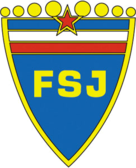
Back የዩጎዝላቪያ ብሔራዊ እግር ኳስ ቡድን Amharic منتخب يوغوسلافيا لكرة القدم Arabic منتخب يوجوسلافيا لكره القدم ARZ Seleición masculina de fútbol de Yugoslavia AST Yuqoslaviya milli futbol komandası Azerbaijani Tim nasional sépakbola Yugoslavia BAN Зборная Югаславіі па футболе Byelorussian Национален отбор по футбол на Югославия Bulgarian যুগোস্লাভিয়া জাতীয় ফুটবল দল Bengali/Bangla Nogometna reprezentacija Jugoslavije BS
| 1920–1992 | |||
|---|---|---|---|
  | |||
| Nickname(s) | Plavi (The Blues) Brazilians of Europe[1] | ||
| Association | Football Association of Yugoslavia | ||
| Most caps | Dragan Džajić (85) | ||
| Top scorer | Stjepan Bobek (38) | ||
| Home stadium | Stadium Rajko Mitić, Belgrade | ||
| FIFA code | YUG | ||
| |||
| First international | |||
(Antwerp, Belgium; 28 August 1920) | |||
| Last international | |||
(Amsterdam, Netherlands; 25 March 1992)[a] | |||
| Biggest win | |||
(Curitiba, Brazil; 14 June 1972)[2][3] | |||
| Biggest defeat | |||
(Antwerp, Belgium; 28 August 1920) (Paris, France; 26 May 1924) (Prague, Czechoslovakia; 28 October 1925) | |||
| World Cup | |||
| Appearances | 8[a] (first in 1930) | ||
| Best result | Fourth place (1930, 1962) | ||
| European Championship | |||
| Appearances | 4[a] (first in 1960) | ||
| Best result | |||
The Yugoslavia national football team[b] represented Yugoslavia in international association football.
Although the team mainly represented the pre-war Kingdom of Yugoslavia and the post-war SFR Yugoslavia, various iterations of the state were formally constituted in football, including the:
- Kingdom of Serbs, Croats and Slovenes (1918–1929)
- Kingdom of Yugoslavia (1929–1945)
- Democratic Federal Yugoslavia (1945)
- Federal People's Republic of Yugoslavia (1945–1963)
- Socialist Federal Republic of Yugoslavia (1963–1992)
It enjoyed success in international competition, reaching the semi-finals[c] at the 1930 and 1962 FIFA World Cups. In 1992, during the Yugoslav wars, the team was suspended from international competition as part of the United Nations sanctions on Yugoslavia.[4][5]
- ^ A farewell to Yugoslavia Archived 7 July 2017 at the Wayback Machine openDemocracy.net. Dejan Djokic; 10 April 2002
- ^ "Jugoslavija – Venecuela 10–0". Reprezentacija.rs (in Serbo-Croatian). 14 October 2009. Archived from the original on 26 February 2019. Retrieved 25 February 2019.
- ^ "1974 FIFA World Cup Germany ™ – Matches – Yugoslavia-Zaire". FIFA.com. Archived from the original on 14 April 2015. Retrieved 25 February 2019.
- ^ Press, The Associated (1 June 1992). "SOCCER; Yugoslav Athletes Banned". The New York Times. ISSN 0362-4331. Retrieved 17 June 2024.
- ^ "Yugoslavia Banned From 1994 World Cup Soccer Play | The Seattle Times". archive.seattletimes.com. Retrieved 17 June 2024.
Cite error: There are <ref group=lower-alpha> tags or {{efn}} templates on this page, but the references will not show without a {{reflist|group=lower-alpha}} template or {{notelist}} template (see the help page).